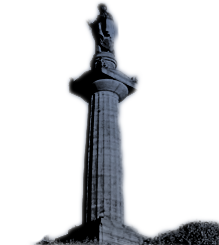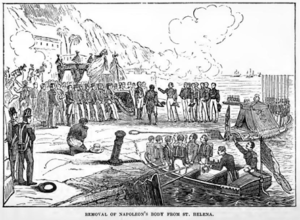Colour Sergeant Donald Campbell
By Morag T Fyfe
Donald Campbell was only 43 (or possibly 44) years old when he died on 2 March 1862 from enteritis. He had been discharged from the 91st Foot almost exactly four years previously as being unfit for further service and had settled in Glasgow with his wife Ann and son Kenneth. When Donald was discharged in January 1858 he had served just over half his life in the army and spent time in St Helena, South Africa and Greece; he was probably fortunate not to have served in the West Indies or India.
Donald Campbell was born in Alness, Ross and Cromarty probably in 1818 but his birth/baptism has not been found (his death certificate names his father as Roderick Campbell and no mother is named).
He enlisted in the 91st (Argyllshire Highlanders) Regiment of Foot at Tain, Ross and Cromarty on 17 October 1836 aged 18. He must have made an impressive recruit as he was 6ft 3in tall. The 91st had recently been stationed in Ireland but was deployed to St Helena at the end of 1835. After initial training at the regimental depot in Naas, county Kildare Donald went to St Helena as part of a party of reinforcements. His service record shows he served there for 3 years 5 months so he must have been on St Helena roughly 1837 to 1841. This suggests that Donald was part of the detachment left on St Helena in June 1839 when the rest of the regiment sailed for South Africa. In 1840 the companies left on St Helena were involved in the exhumation of the body of the Emperor Napoleon prior to its return to France. Napoleon had died in 1821 and in October 1840 a squadron of French ships arrived to collect his remains and take them back for burial in Paris. The 91st played a part in the ceremonial which marked this event and it seems likely Donald Campbell was involved.
In December 1842 the remaining companies of the 91st were ordered to proceed to South Africa and rejoin the main body of the regiment. For the next five and a half years Donald served in South Africa and took part in what was then called the Kaffir War of 1846-7. This was the seventh of nine wars which took place in the nineteenth century between the British and the Boers, against the Xhosa people caused by increasing pressure on land and other resources. In 1856 a medal was issued to the troops who took part in the war. Soon after reaching South Africa Donald received promotion to corporal in July 1843 and an extra 1d per day good conduct pay in October 1843. After seven years in the regiment, he had obviously settled in well and was starting to make a career for himself. Promotion to sergeant followed quickly in July 1844 but then came a temporary setback when Donald faced a regimental court martial on 23 December 1846 on the charge of ‘drunkenness on escort’. He was reduced back to private but the sentence was remitted and he was reinstated as sergeant on 25 December 1846. At this time the regimental history states that the regiment was heavily involved in guarding convoys of supplies.
In 1848 the 91st returned to Britain and spent the next few years at home. During this period the regiment first spent time in the south of England at Gosport and Dover before moving north to Preston, Liverpool and Manchester. The 1851 census helpfully confirms Donald’s location on census night as being Liverpool. Later in 1851 the regiment crossed to Ireland and remained there in various locations until 1854.
During this period Donald continued to make good progress in his career, being promoted colour sergeant in April 1851. He felt sufficiently secure to marry Ann Corner also from Ross and Cromarty soon after his return from South Africa. There seems to be no record of their marriage in either England or Scotland but the Scottish records for this period are patchy and one wonders whether he returned home on leave to Alness to marry a daughter of George Corner the church officer at Munlochy just along the coast from Alness. George had a daughter of a suitable age according to the 1841 census. It is an interesting speculation but no more than that. The marriage resulted in the birth of a son, Kenneth, in Gosport in 1849.
Between 1853 and 1856 Britain and France were at war with Russia in support of the Ottoman Empire (the Crimean War). The 91st only played a peripheral part in this conflict. Newly independent Greece took advantage of the war to try and expand its territory by invading Thessaly and Epirus still under Ottoman control. To block further moves by Greece, Britain and France sent a force to occupy the Piraeus and the 91st was part of this force. The regiment left Ireland for Malta late in 1854 and reached Greece in early 1855. Thirty women and fifty-one children accompanied the regiment, but it is not known whether Ann and Kenneth were among this group. The regiment landed at Piraeus, the port for Athens in March 1855 and were stationed there for the next two years until the Allied forces withdrew, the 91st moving to the Ionian Islands which were a British protectorate at the time.
By this time Donald had been in the army for twenty years and it was becoming obvious he was no longer physically fit enough to be a soldier. In November 1857 a regimental board was convened on Cephalonia (Donald was on detachment on Ithaca at the time) to consider his discharge. The regimental surgeon described him as ‘worn out from long service and climate’ and he was deemed unfit for further service. Donald was returned to England and at the end of December went before another medical board at the General Army Hospital, Fort Pitt, Chatham. The unreadable scrawl of the Principal Medical Officer at Chatham presumably confirmed the regimental surgeon’s verdict and Donald Campbell was discharged to pension on 24 January 1858 after serving for 21 years and 102 days.
It is not known why Donald and his family chose to settle in Glasgow rather than return to Alness or Munlochy but the family of three is found living in Weaver Street, Glasgow on census night 1861. Donald’s occupation is simply described as Chelsea pensioner but at his death the following year his occupation is given as ‘drill instructor’ which makes one wonder whether he had found employment with one of the Volunteer battalions in Glasgow.
Donald Campbell was buried on 5 March 1862 in common ground in compartment Eta of the Glasgow Necropolis. Nothing further is known about his wife or son.










